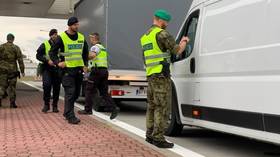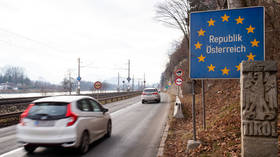Soldiers sent to border between two EU countries

The Czech Army has deployed more than 300 soldiers to the border with Slovakia in an effort to tackle the influx of illegal migrants. The authorities cited the record number of people arriving in the country, mainly from Syria.
According to a statement from the military, starting on Sunday and until temporary border protection measures remain in place, they will assist law enforcement in the South Moravian, Zlin, and Moravian-Silesian regions in conducting border checks.
“A total of 320 soldiers of the armed forces of the Czech Republic will be prepared, who will be deployed in 4 rotations. These are soldiers from ground forces units, who will be supplemented by members of the active reserve. Soldiers will perform tasks in joint patrols,” the military said.
Temporary border controls were reimposed by Prague in late September amid the growing number of migrants, mainly Syrians, mostly coming from Turkey. Earlier this week, the government announced an extension of security measures on the border for another 20 days, until late October.
According to Milan Majer, the head of the Czech Foreign Police, the border checks are bearing fruit. In an interview with Radiozurnal earlier this week, Majer claimed that by the fifth day of the checks, which were launched on September 29, there was “a slight decrease” in the number of migrants.
As of October 5, Majer said, law enforcement officials checked almost 200,000 people and 120,000 vehicles.
“We found over 1,600 people involved in illegal transit migration. We did not allow more than 500 people into the territory of the Czech Republic,” he said.
According to the Interior Ministry’s estimate, border controls will cost the country about 110 million crowns per month, the equivalent of $4.4 million.
In September, the ministry explained its decision to launch border controls, saying that almost 12,000 illegal migrants had been detained this year – more than during the migrant crisis of 2015.
The Czech Republic’s move prompted neighboring Austria to also introduce checks on its border with Slovakia.
Meanwhile, Czech, Slovak, Hungarian, and Austrian officials have been engaged in intensive discussions on enhanced protection of the external borders of the Schengen area.
Despite being part of the visa-free zone, Schengen countries have repeatedly reinstated border controls over the past few years, due to the rise in migration, as well as the Covid-19 pandemic. The total period of a temporary reintroduction of controls at the national level cannot exceed two months under EU rules.













